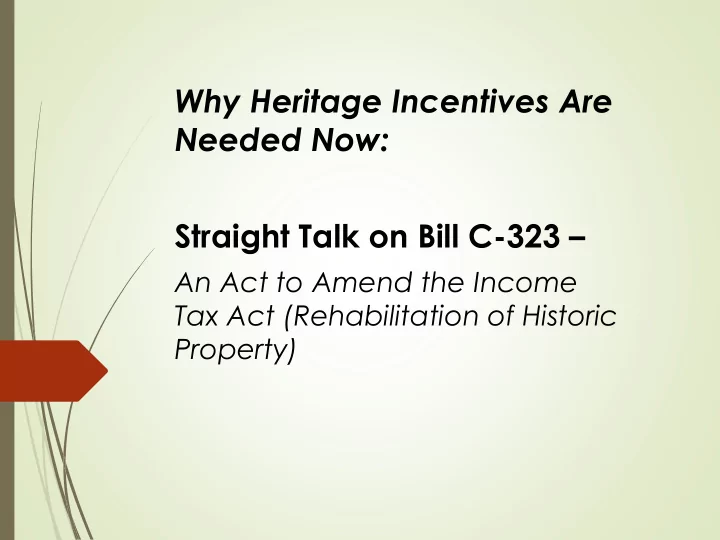

Why Heritage Incentives Are Needed Now: Straight Talk on Bill C-323 – An Act to Amend the Income Tax Act (Rehabilitation of Historic Property)
The Liberal Party of Canada expressed willingness to consider financial incentives for historic places in its October 2015 pre-election message to the heritage sector. Responding to written questions from the National Trust for Canada, Liberal Party president Anna Gainey wrote : “A Liberal government will work in collaboration with the heritage sector and other stakeholders to examine measures that promote the preservation and rehabilitation of Canada’s heritage buildings. We are open to measures that use the tax system that stimulate private investments in heritage buildings.”
Bill C-323 Proposes Federal Incentives for the Rehabilitation of Canada’s Historic Places On December 1, 2016, a Private Members Bill to create incentives for historic places was tabled in the House of Commons. Bill C-323 – An Act to Amend the Income Tax Act (Rehabilitation of Historic Property) – is based on a great US success story with a 40-year track record.
Why Measures like those in Bill C-323 are needed: In the thirty years between 1970 and 2000, Canada lost more than 20% of its historic building stock. Federal rehabilitation tax incentives like those proposed in Bill C-323 are a proven way to attract private and corporate investment to privately- owned historic places, and give older buildings vibrant new uses .
Challenges Developers of Heritage Properties Face Financial risk and unpredictability • Cost of rehabilitating is 8% - 44% higher than new • build New buildings are easier to plan • Federal Income Tax Act can be a disincentive • E.g., uncertainty over what can be • expensed in current year vs. what must be capitalized and depreciated over decades Financing more difficult to obtain •
Incentives Counteract the Challenges • Counter higher/unpredictable costs of rehab in an industry geared towards new build • Increase developers’ access to financing • Encourage recycling and reusing older buildings
About Bill C-323 Bill C-323 includes the creation of: A 20% tax credit on eligible costs for rehabilitation • work done to designated historic places (commercial & owner-occupied residential); and An accelerated Capital Cost Allowance • (25%/50%/25%) for eligible capitalized costs incurred under the same conditions of the tax credit (commercial only) These two tax measures would transform the economic fundamentals for renewing historic places. In the process they would create more skilled jobs and generate less carbon than new construction.
Why should Government support Financial Measures for Historic Places? Job Creation – Rehabilitation generates upwards of 21% more jobs, including skilled jobs, than the same Investment in new construction. Economic Stimulus that is Effective, Targeted – The tax credits in Bill-C323 are inspired by the success of the US Federal • Historic Tax Credit Program in place for 40 years. Since 1976, $23.1 billion in US federal credits have generated more than • $28.1 billion additional federal tax revenue and leveraged over $120.8 billion private investments (a 5 to 1 ratio of private investment). Created over 525,000 housing units, 27% of which were affordable for • low/moderate income families. Economic Impact Stays in Canada – Heritage rehabilitation also incurs less “leakage” out of the Canadian economy for foreign goods. Fights Climate Change – Building renewal and re-use capitalizes on materials and energy already invested, reduces construction and demolition waste, and avoids environmental impact of new development. A recent study shows that it takes from 10 – 80 years for a new “green” building to make up for the negative climate change impacts of it’s construction.
Successful Models United States The US tax credit has leveraged over $36 billion in private investment to preserve 38,000 historic properties (a 5 to 1 ratio of private investment to tax credits). Canada A federal program designed to test the appetite for a similar program saw $21.5 M in federal contributions leverage 8 times in private investment ($177 M) Laughed Block, Calgary, AB McNaughton Building, Mossman, SK
A New Heritage Rehabilitation Incentive: It is time. • Tools to administer new incentive are in place: • Canadian Register of Historic Places • National Standards for Conservation • Unanimous support from provincial and municipal stakeholders, developers and heritage organizations • The U.S. government refers to its tax credit as the most effective federal program to promote urban and rural revitalization and encourage private investment in rehabilitating historic buildings.
Other measures needed to attract investment to historic places: Tax incentives will benefit a broad range of property in private ownership. For heritage properties owned by non-profits and charities, however, a substantial and predictable source of matching grants is also essential. The National Cost-Sharing Program for Heritage Places is a start, and its recent increase to $10 million per year is a positive yet still modest step in the right direction. The Government should also consider a mechanism where donations by private individuals and corporations would be matched by the federal government, encouraging philanthropy.
Summary: Heritage Rehabilitation Incentives If we reduce financial risk and provide incentives; • Income Tax Act amendments like Bill C-323 to attract private investment • Matching grants to leverage private funding … Canada will reap the rewards: • Jobs and growth • Reduce landfill • Reduce energy use and greenhouse gases • Protect national treasures for future generations
The Way Forward The Office of the Minister of Finance has stated that the Government will oppose Bill C-323. If the Government will not support Bill C-323 as drafted, will it consider amendments? If not, how and when will the Liberal Government move forward with its 2015 promise to examine financial incentives for historic places? Can we work together? Thank you! For more information: Natalie Bull, Executive Director, National Trust for Canada nbull@nationaltrustcanada.ca Tel 613-237-1066 x 222 Chris Wiebe, National Trust Manager of Programs and Policy, cwiebe@nationaltrustcanada.ca
Recommend
More recommend